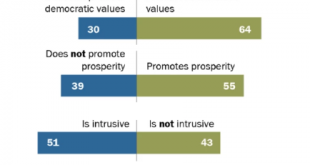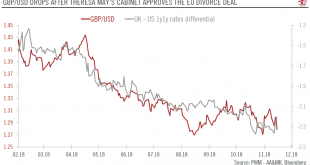Is the energy crisis something that can be resolved? Was it always inevitable? Will renewable energy make it all OK? Are Western financial policies to blame? All this and more in today’s The M3 Report! If you’re not already subscribed to GoldCoreTV then click here right now to make sure you’re all set to watch the fifth episode of our flagship show. [embedded content] Featuring Mr. Energy himself Steve St. Angelo as well as a short explanation from Brent Johnson on...
Read More »Market Economy Beats Planned Economy
Throughout the next weeks, we will regularly feature the keynote speeches held by our distinguished experts at this year’s digital Free Market Road Show. The times we are living in – the pandemic – are times when our fundamental values are threatened maybe more than ever in modern times. More than ever in modern times because we are living not in a time of containment, with an Iron Curtain, or a Bamboo Curtain, dividing the world in two as in the Cold...
Read More »Comments on Geneva Report 23
Panel with Elga Bartsch, Agnès Bénassy-Quéré, Giancarlo Corsetti, Olivier Garnier, and Charles Wyplosz. Moderated by Tobias Broer. Elga Bartsch, Agnès Bénassy-Quéré, Giancarlo Corsetti, Xavier Debrun: Geneva Report 23 | It’s All in the Mix: How Monetary and Fiscal policies Can Work or Fail Together. Event at PSE. My comments on the report.
Read More »On the Declining Political Support for Economic Unions
In an NBER working paper, Gino Gancia, Giacomo Ponzetto, and Jaume Ventura propose a theory of declining public support for economic unions: Broad gains from trade in differentiated goods make way for distributive conflict due to specific factors: … this is partly due to the growth of trade between countries that are increasingly dissimilar. … political support for international unions can grow with their breadth and depth as long as member countries are sufficiently similar....
Read More »On the Gains from Integration in the European Union
In an interview with the NZZ, Gabriel Felbermayr explains where the European Union adds value, and where it doesn’t. The key points: Free trade for goods and services as well as capital and labor mobility are partial substitutes. Partial, because factor mobility fosters trade and technology transfer. Estimates suggest that free trade and capital mobility generate more than 80% of the welfare gains from European integration. Even labor mobility does not require admission into welfare...
Read More »Europe Comes Apart, And That’s Before #4
In May 2018, the European Parliament found that it was incredibly popular. Commissioning what it calls the Eurobarameter survey, the EU’s governing body said that two-thirds of Europeans inside the bloc believed that membership had benefited their own countries. It was the highest showing since 1983. Voters in May 2019 don’t appear to have agreed with last year’s survey. For the first time since 1979, Social Democrats...
Read More »Europe’s Response to the US-Iran Sanctions: Accounting Rather than Banking
On Spiegel online, Christoph Schult reports about “Instrument in Support of Trade Exchanges” (Instex), the new special purpose vehicle founded by France, Germany, and the UK with the task to facilitate legitimate trade with Iran. Instex is not meant to bust US sanctions, but to circumvent the banking sector which the the three countries perceive as “overcomplying.” Eigentlich dürfen europäische Unternehmen alle Waren, die nicht den Sanktionen unterliegen, weiter in den Iran exportieren....
Read More »Europe’s Response to the US-Iran Sanctions: Accounting Rather than Banking
On Spiegel online, Christoph Schult reports about “Instrument in Support of Trade Exchanges” (Instex), the new special purpose vehicle founded by France, Germany, and the UK with the task to facilitate legitimate trade with Iran. Instex is not meant to bust US sanctions, but to circumvent the banking sector which the the three countries perceive as “overcomplying.” Eigentlich dürfen europäische Unternehmen alle Waren, die nicht den Sanktionen unterliegen, weiter in den Iran exportieren....
Read More »After May’s divorce deal: the road ahead for Brexit
But significant political challenges lie ahead before the 29 March deadline for Brexit. Sterling likely to be in the spotlight for several months. Theresa May’s cabinet has approved her divorce deal with the European Union (EU). A few cabinet secretaries have resigned, including Brexit Secretary Dominic Raab because the deal keeps the UK in a transitory ‘customs union’ with the EU, which in his view continues to give...
Read More »Legal Commentary on U.S. Iran Sanctions and the EU’s Blocking Statute
Laurent Ruessmann and Jochen Beck, FieldFisher, 17 July 2018, International firms caught between US Iran sanctions and EU blocking statute. Several authors, Gibson, Dunn & Crutcher LLP, 9 August 2018, The “New” Iran E.O. and the “New” EU Blocking Sanctions—Navigating the Divide for International Business. The “primary sanctions” that limit U.S. companies and persons from engaging with Iran have on the whole never been lifted. The principal sanctions relief provided by the United...
Read More » Swiss Economicblogs.org
Swiss Economicblogs.org



